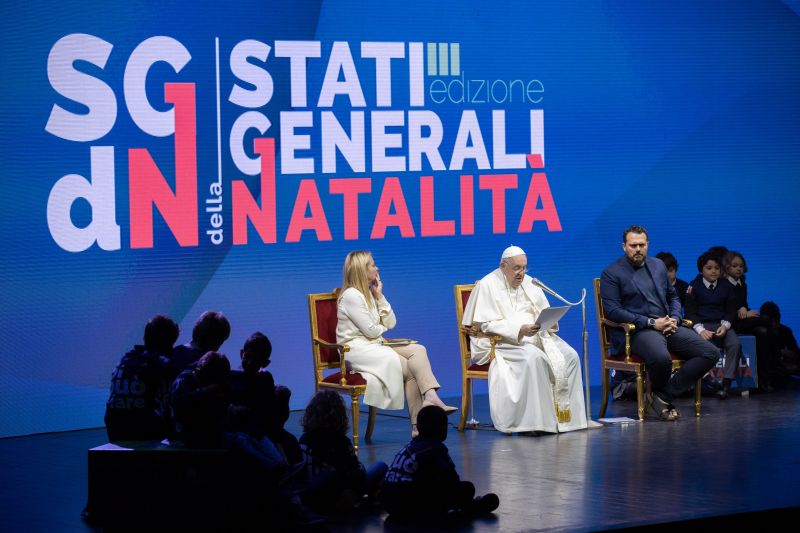 Pope Francis shared a stage with Italy’s Prime Minister Giorgia Meloni on May 12, 2023, to speak at a two-day conference on “The General State of the Birth Rate,” held at Conciliazione Auditorium close to the Vatican. / Daniel Ibanez/CNA
Pope Francis shared a stage with Italy’s Prime Minister Giorgia Meloni on May 12, 2023, to speak at a two-day conference on “The General State of the Birth Rate,” held at Conciliazione Auditorium close to the Vatican. / Daniel Ibanez/CNA
Rome Newsroom, May 12, 2023 / 07:00 am (CNA).
Pope Francis said Friday a society’s birth rate is a key indicator of the hope people have in the future.
The pope shared the stage on May 12 with Italy’s Prime Minister Giorgia Meloni during a two-day conference on “The General State of the Birth Rate,” held at Conciliazione Auditorium close to the Vatican.
“The birth of children, in fact, is the main indicator for measuring the hope of a people,” Pope Francis said. “If few are born it means there is little hope. And this not only has repercussions from an economic and social point of view but also undermines confidence in the future.”
“The General State of the Birth Rate” is a conference for Italian political, business, and organization leaders to reflect on Italy’s demographic crisis, caused by one of the lowest birth rates in Europe: 1.25 births per woman.
The event was organized by the Foundation for Births and the Family Associations Forum and supported by the Italian Ministry for Family, Birth, and Equal Opportunity.
This was the third annual conference and the second time Pope Francis attended. In 2022, he sent a message to be read at the event.
Italy hit a historic low number of births in 2022, with only about 393,000 children born in the country.
The same year, the country saw 700,000 deaths, marking a dangerous decline in population.
The low number of births, Pope Francis said, “is a figure that reveals a great concern for tomorrow.”
He lamented that childbearing and rearing is seen as the burden of families only, and the pressure this puts on young adults today, “who grow up in uncertainty, if not disillusionment and fear.”
Young people “experience a social climate in which starting a family has turned into a titanic effort, instead of being a shared value that everyone recognizes and supports,” he said.
The decline in communal living, together with an increasing self-reliance creates loneliness, Pope Francis said, and one consequence is that only the wealthy have the freedom to live the life they want.
“This is unfair, as well as demeaning,” he added.
The pope also criticized a culture that places pets before human children.
He said at a recent audience, he went to greet a woman of around 50 years old — “like me,” he joked — but was surprised to be asked to bless her dog, which she called, “my baby.”
“I had no patience and scolded the lady,” he said, pointing out the great number of hungry children in the world.
Pope Francis used a walker to move on stage on Friday, referencing the pain he experiences while standing.
At the beginning of his speech, the pope said: “I’m sorry for not standing up while speaking, but I cannot tolerate the pain when I am standing.”
In what appeared to be a reference not only to welcoming the birth of children but also to welcoming migrants, Pope Francis said “a happy community naturally develops desires to generate and integrate, to welcome, while an unhappy society is reduced to a sum of individuals trying to defend what they have at all costs.”
He emphasized again that “the birth rate challenge is a matter of hope,” though, he underlined, hope is not the same as optimism or “a vague positive feeling about the future.”
Hope, he said, “is not an illusion or an emotion that you feel, no; it is a concrete virtue, a life attitude. And it has to do with concrete choices. Hope is nourished by each person’s commitment to the good, it grows when we feel we are participating and involved in making meaning of our own and others’ lives.”
“Hope generates change and improves the future. It is the smallest of virtues — Péguy said — it is the smallest, but it is the one that takes you the furthest. And hope does not disappoint,” Francis said.
